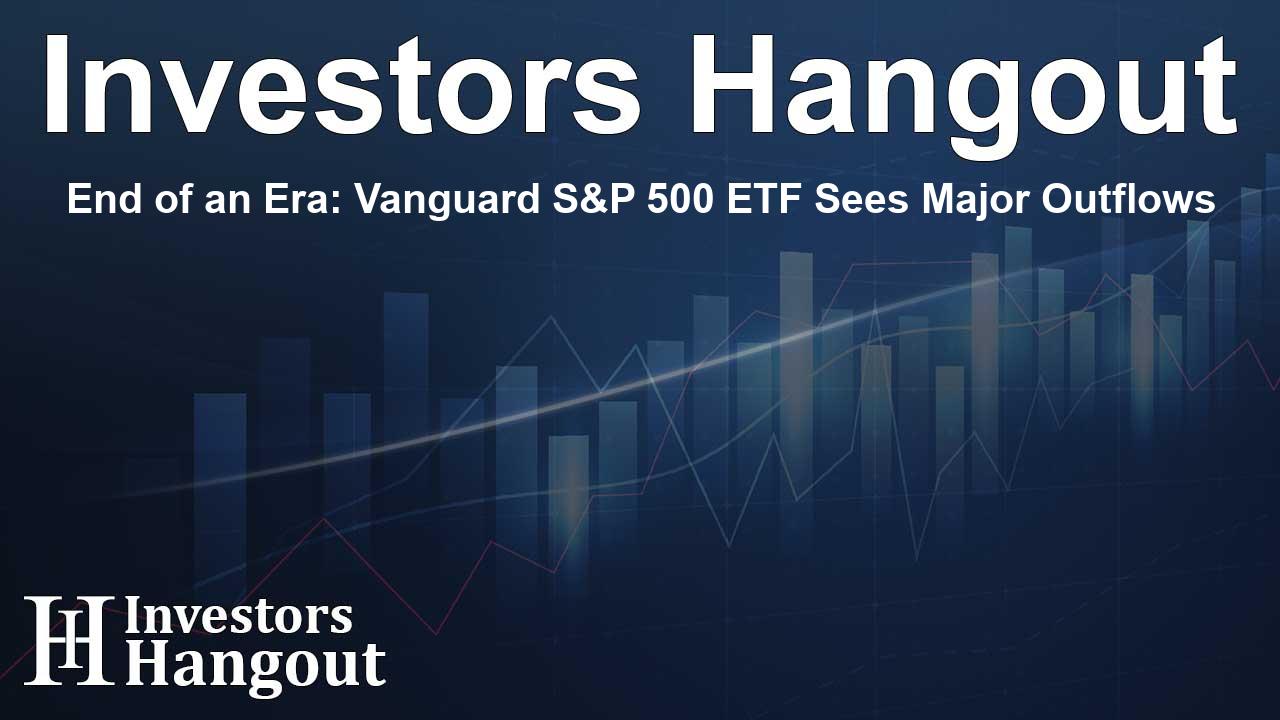End of an Era: Vanguard S&P 500 ETF Sees Major Outflows

Recent Shift in ETF Investment Trends
In a surprising turn of events, a remarkable streak of inflows into the Vanguard S&P 500 ETF has come to an abrupt halt in June. Despite the S&P 500 reaching fresh all-time highs, the ETF has experienced a staggering $5.69 billion in outflows, marking the first monthly net redemption since December 2022 and the second-largest outflow since the fund's inception in 2015.
Contrasting Market Performance
The significant redemptions point to a disconnect between market performance and investor sentiment. Although the S&P 500 celebrated record highs in late June, many institutional and retail investors have chosen to take profits and lessen their exposure to the market.
Vanguard's Dominance in the ETF Space
Over the three years leading up to this month, the Vanguard S&P 500 ETF (NASDAQ: VOO) attracted an impressive $250 billion in inflows, successfully surpassing competitors like the SPDR S&P 500 ETF Trust (NYSE: SPY) to claim its title as the largest ETF globally. This shift is noteworthy, especially considering the ETF's colossal growth in a relatively short span.
Broad-Based Withdrawals from Major ETFs
The outflows from VOO are just a part of a larger wave, as other significant large-cap funds have also faced notable investor withdrawals. For instance, the Invesco Equal-Weight S&P 500 ETF (NYSE: RSP) saw $1.6 billion in outflows in June, reflecting its largest monthly redemption since March 2020, while the SPDR Dow Jones Industrial Average ETF (NYSE: DIA) experienced $1.7 billion in redemptions, marking its most significant decline since late 2020.
Emerging Trends in Investor Behavior
Interestingly, even newer funds aren't immune to this trend. The Roundhill Magnificent Seven ETF (CBOE: MAGS), aimed at mega-cap tech investments, faced a $102 million outflow. This situation represents only the second decline in assets since its launch in November 2023, raising questions about investor confidence.
Reasons for Investor Hesitance
Veteran market strategist Ed Yardeni has noted that despite improvements in geopolitical conditions and trade policy under recent administrations, investor sentiment continues to be cautious. "While the stock market has rebounded to record heights following the resolution of some major concerns, investors are still hesitant," he remarked.
Disconnect Between Price Action and Investor Sentiment
Yardeni emphasized that traditional sentiment indicators still point to subdued investor confidence. He suggests that the current rally may be propelled more by passive or algorithmic flows than genuine enthusiasm from investors, highlighting a potential disconnect between stock appreciation and the sentiment of market participants.
Technical Outlook in Light of Macro Risks
From a technical standpoint, Adam Turnquist, chief technical strategist at LPL Financial, indicated that historical precedent suggests that momentum tends to build after markets hit new peaks. Following such milestones, the S&P 500 has traditionally demonstrated average one-year returns around 9.7%, with 74% of similar occurrences resulting in positive returns.
Potential Hurdles Ahead
Despite the optimistic outlook, Turnquist has cautioned about various macro risks that could constrain further market advances. He perceives that the market may have already priced in much of the good news, making future growth conditional on several key factors aligning favorably, including unexpected positive earnings surprises and stability in trade policies.
Conclusion: Future of the S&P 500 ETFs
As the Vanguard S&P 500 ETF (VOO) and other major funds navigate this changing landscape, it remains to be seen how market dynamics will unfold. The intertwining patterns of investor behavior and market performance will significantly shape the trajectory of these financial instruments.
Frequently Asked Questions
Why did the Vanguard S&P 500 ETF experience large outflows recently?
The Vanguard S&P 500 ETF (VOO) faced significant outflows of $5.69 billion in June, reflecting a change in investor sentiment despite market gains.
Which ETFs are also facing significant redemptions?
In addition to VOO, other major ETFs, such as the Invesco Equal-Weight S&P 500 ETF (RSP) and the SPDR Dow Jones Industrial Average ETF (DIA), have also seen significant outflows recently.
What can investors expect moving forward?
Market experts caution that while technical indicators suggest potential for growth, macroeconomic risks and subdued investor sentiment may keep advancements limited.
What factors could influence future ETF performance?
Future ETF performance could hinge on positive earnings surprises, trade policy stability, and overall market sentiment as investors react to ongoing economic changes.
What is the current status of the overall stock market?
The overall stock market, exemplified by the S&P 500, is experiencing record highs, yet this is accompanied by investor caution regarding prolonged growth.
About The Author
Contact Logan Wright privately here. Or send an email with ATTN: Logan Wright as the subject to contact@investorshangout.com.
About Investors Hangout
Investors Hangout is a leading online stock forum for financial discussion and learning, offering a wide range of free tools and resources. It draws in traders of all levels, who exchange market knowledge, investigate trading tactics, and keep an eye on industry developments in real time. Featuring financial articles, stock message boards, quotes, charts, company profiles, and live news updates. Through cooperative learning and a wealth of informational resources, it helps users from novices creating their first portfolios to experts honing their techniques. Join Investors Hangout today: https://investorshangout.com/
The content of this article is based on factual, publicly available information and does not represent legal, financial, or investment advice. Investors Hangout does not offer financial advice, and the author is not a licensed financial advisor. Consult a qualified advisor before making any financial or investment decisions based on this article. This article should not be considered advice to purchase, sell, or hold any securities or other investments. If any of the material provided here is inaccurate, please contact us for corrections.
